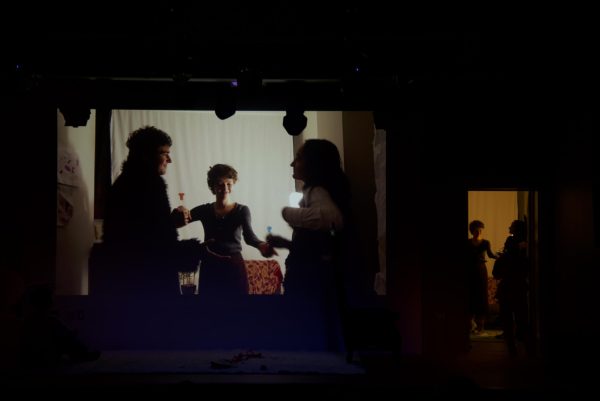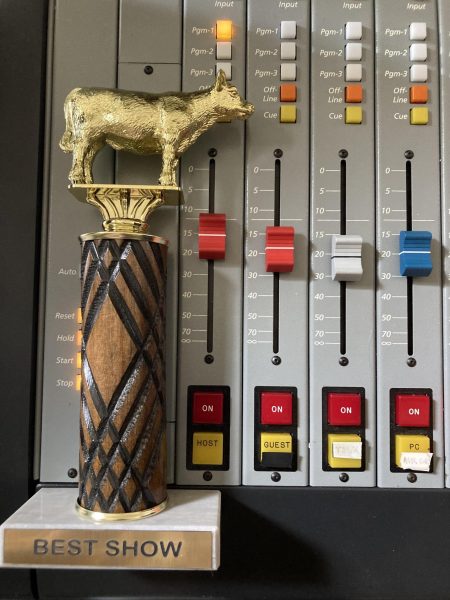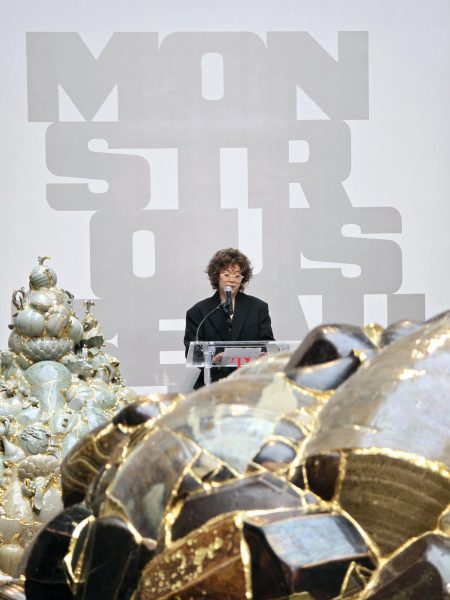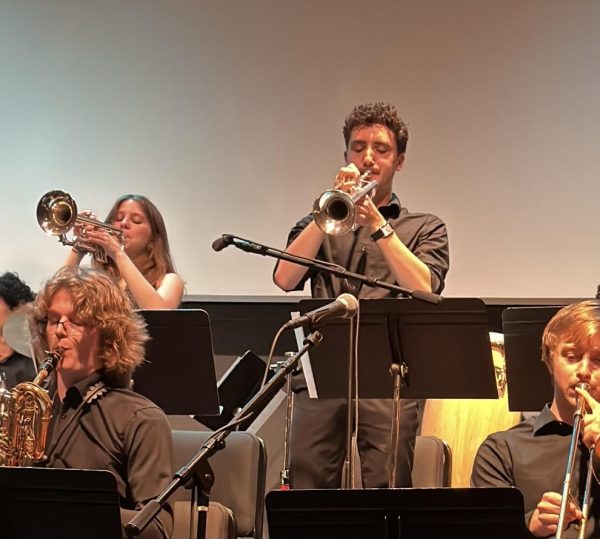Williamstown Theatre Festival crew members decry working conditions
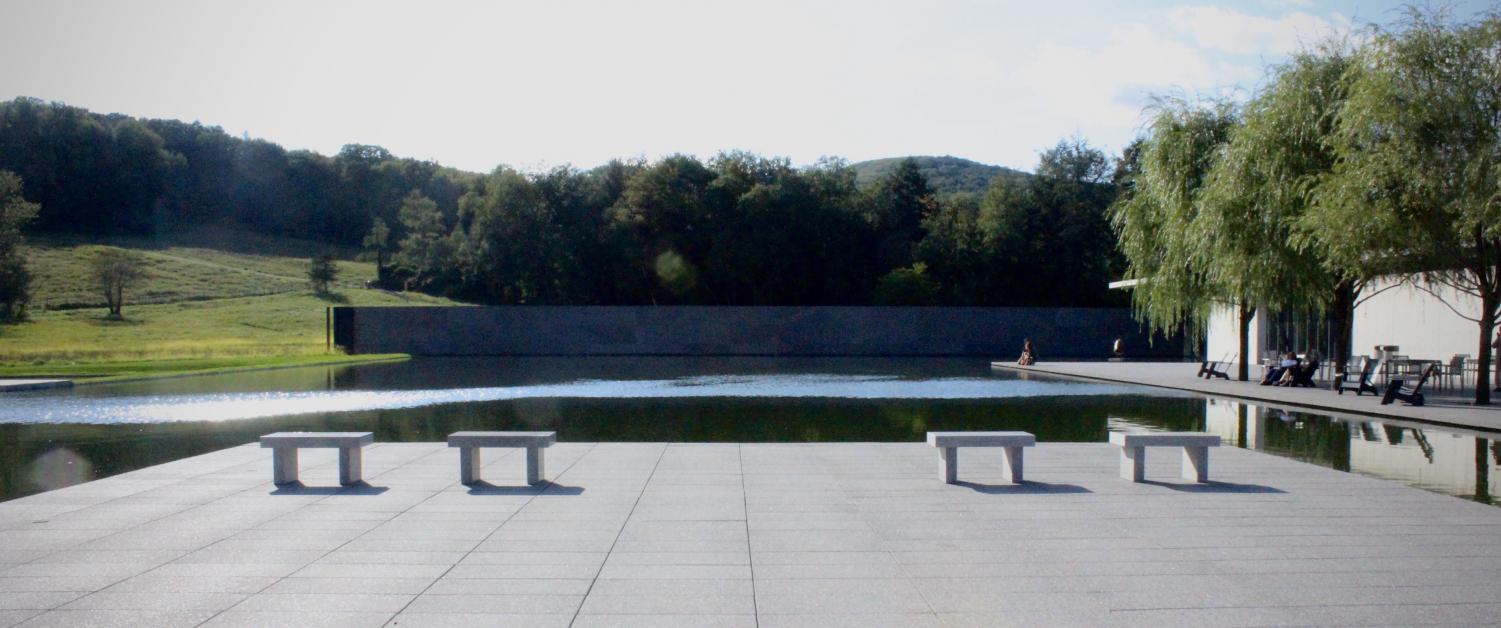
The Williamstown Theatre Festival (WTF) closed on Aug. 15, marking the end of the festival’s return to in-person theater — and the end to a contentious summer within the organization.
On July 14, during a rehearsal for Row, one of this year’s mainstage productions, the sound crew walked out to protest what they said were unsafe working conditions. In the wake of the walkout, many festival workers from past years shared similar experiences on social media of feeling overworked, unsafe, and underappreciated, suggesting that the walkout reflects deeper issues within the labor structure of the WTF. In interviews with the Record, four past workers (who spoke on the condition of anonymity to speak freely about their experiences) echoed many of these concerns.
‘It’s not something that people are capable of doing in a healthy way’
Each show of this season was staged outside — a first for the festival — due to concerns around COVID-19 transmission during indoor performances. “I think they [festival management] expected to do things on an indoor theater schedule when they didn’t have indoor theater conditions,” a lighting assistant told the Record, speaking on condition of anonymity. “They expected everything to get done on the same timeline that it usually gets done, and that just wasn’t possible. It’s not something that people are capable of doing in a healthy way.”
Row, an original musical about the first woman to row solo across the Atlantic Ocean, was staged at the reflecting pool at the Clark Art Institute. The staging of the show required many hours of outdoor rehearsal, which were frequently interrupted by the summer’s unusually heavy and frequent rains.
“When it started intensely raining, all the actors were shuffled off to their fancy tent, while the crew was basically told to find a spot,” the lighting assistant said.
According to the lighting assistant and other anonymous workers interviewed in The Berkshire Eagle, entire days of technical rehearsals of Row were canceled due to heavy and persistent thunderstorms, forcing the crew to work even longer hours on the few days with clear weather. At the time of the walkout, the crew had worked 13 hours a day for 13 days straight — all without overtime pay, the lighting assistant said. The crew received minimum wage and had to pay for campus housing throughout the duration of the festival. In an email to the Record, WTF representatives wrote that “Williamstown Theatre Festival produced ROW on a rehearsal schedule typical of a world premiere musical.”
To comply with the Clark’s rules and to preserve equipment that is not meant to be outdoors for long periods of time, the crew had to set up and break down technical materials each day. This was a two-hour process in addition to the 12-hour tech days, said the lighting assistant and other anonymous workers interviewed in the Eagle.
On one particularly rainy day, July 14, after taking apart and rebuilding all the equipment for Row multiple times due to rehearsal stopping and starting, the rehearsal was finally canceled for the day, according to the lighting assistant. While the actors were able to leave immediately, the crew had to stay and take apart the equipment one last time, as the rain continued to worsen. It was too much for the sound crew, who then got up and walked out.
‘That means nothing’
Although the heavy rain and repeated deconstruction of the set on the day of the walkout were the turning points, the lighting assistant said the walkout resulted from a variety of factors contributing to a stressful work environment, not just the rain. They said there were disparities in treatment between actors and technicians, a lack of forethought for doing outdoor theater that resulted in unsafe conditions, and a general lack of respect from the festival leadership towards technical workers. When asked by the Record to comment on these allegations, WTF leadership wrote that “Williamstown Theatre Festival takes the safety and well-being of its employees seriously and works tirelessly to create an environment led by the values of equity, diversity, inclusion and access.”
In an interview with the Eagle, another anonymous crew worker said that the rehearsal process was grueling, with intense night shifts, so by the time of the walkout, the workers were “pushed to the brink.”
The morning after the walkout, the sound crew met with WTF Artistic Director Mandy Greenfield and other members of the festival leadership team. The meeting resulted in increases in pay and a shortened work schedule for the full crew. An anonymous source told the Eagle that the pay increase was $3 an hour, with the assurance that people would get at least eight hours off each night, but the festival declined to confirm or deny this.
In an interview with the Record, Greenfield said, “I would never wish for anyone to work in the rain or have any harm caused to them, but to the extent that we had that experience and had to learn from it, I’m grateful for everyone who raised those concerns and learned with us.”
“The beauty of making theater is that every time you do it, you learn from it and you grow, and change, and evolve, and absorb the learning and process it, so that you make new decisions each time,” Greenfield continued. “That’s how we get better.”
Despite Greenfield’s hope for a better environment, the lighting assistant said they felt that Greenfield’s actions were “mostly very small shifts, and it came after the issue was already over.”
Because the walkout took place on one of the last days of tech rehearsals before the show opened, the days would already be shorter, so the new rule of shortened hours did not have a significant impact. “That [rule] felt a little bit disingenuous,” they said. “It was definitely something, but it should have happened earlier.”
The lighting assistant mentioned an email Greenfield sent out reiterating WTF’s commitment to change and diversity.
“It’s just very annoying to read that email, because it’s like, what are you even saying?” the lighting assistant said. “You’re saying you’re committing to do better? How about you just do better? Just tell us how you’re actually doing better instead of just saying that you are committed to it. That means nothing.”
‘Nothing cares about you as little as WTF’
The July 14 walkout was first reported on by the Instagram account @changeberkshireculture, an account in which workers in the Berkshire cultural sector can send in anonymous stories of professional mistreatment. In the comments on the post announcing the walkout and in later posts, many festival workers from past years anonymously shared similar experiences, such as “it was honestly the worst summer of my entire life,” “a red carpet is rolled out for the actors while the staff is treated like dirt,” and “it has become clear that the festival has prioritized the business of producing a product far above any ethical consideration to how that product is produced.”
The festival is famous both for premiering new works featuring renowned actors and for its internship program, a highly coveted opportunity for aspiring theater professionals to make connections and gain experience in the field. Prior to this year, both the festival’s acting apprentice program (which required a participation fee) and internship program were unpaid and charged fees for housing. While the training programs are selective and impressive on a resume, they are known for intense working conditions.
In addition to the lighting assistant on Row, a former lighting intern, a former production intern, and a participant in this summer’s BIPOC Theatre-Maker program spoke to the Record on the condition of anonymity.
One person who commented on a @changeberkshireculture post, an unpaid lighting intern who worked for the festival in the late 2000s, wrote in an email to the Record that “the pace was literally nonstop — the work would just steamroll you.”
“At WTF, there’s no taking care of yourself,” they continued. “Most days we worked [from] 8 a.m. to midnight. Food was not provided at the festival. The nearest proper grocery store closed at midnight… It was possible to literally not have food to eat.”
While the theater industry is broadly known for intense working conditions and tech weeks — after all, “the show must go on” — staff members say WTF has taken this maxim further than is normal or healthy. “I have worked three different summer festivals, I have worked professionally in regional and educational theaters, I currently work on Broadway,” the former intern wrote to the Record. “Nothing is as backbreaking as WTF. Nothing cares about you as little as WTF. WTF’s reputation in the Broadway community is abysmal, because we [the Broadway community] value our people more than we value trying to put on a show.”
In response, Greenfield said that WTF is unique in that all the work shown is generated and created at the festival for the first time, so every piece is a world-premiere production. “I imagine that through us being a generative theatre, the nature of the work is that it is intense,” she said. “This is not to say that presenting [existing work] is not hard work — it is just different, and that might account for some of those differences in work.”
While the festival does offer connections and workshops with industry professionals, crew members said it can be hard to take advantage of them because of how overworked they feel. In past seasons, the crew had to work on Sundays starting at 4 p.m., when they would spend the night and following day changing the lights and sets over from one show to the next.
“You would think we’d be afforded the opportunity to rest and run errands before the beginning of essentially a straight 36-hour day, but we were required to attend classes and workshops hosted by designers and other folks in the field,” wrote the former lighting intern.
“At any other point I would have been grateful for this learning opportunity, but this felt like a mean joke,” they continued. “To be in a small class taught by a Tony-winning designer, or by the creator of a field-changing software, is rare and honestly very cool. It felt exceedingly cruel to have these sessions on Sunday mornings when we were all spent from the work of the week and couldn’t enjoy the time to the fullest.”
A College alum, who was a summer production intern for WTF during their time as a student, said they received money from the Alumni Sponsored Internship Program and free housing on campus for what would have otherwise been an unpaid experience with costly housing.
“It was just a lot of overworking and working overnight,” the former production intern said. “It’s just insane, and it’s built into the fabric of the festival that this is just what you do. Instead of changing the structure of the festival, they’re going to overwork you, and then people are tired, things are forgotten, and you’re not as aware of your surroundings.”
They recalled an incident when one of the wires holding a heavy set piece above the stage was not properly secured because the technical team was not able to check all their work under the time constraints, causing the set piece to come crashing down. Luckily, no one had been standing onstage, but “those things often happen because of those working conditions,” according to the intern. When asked by the Record to comment on these allegations, WTF leadership largely declined to comment, writing that the Festival does not share employment information with third parties.
This intern’s experience echoes that of the former lighting intern, who said that the lighting interns had to carry heavy cables up seven flights of stairs, a process that is typically motorized in professional theatres. “We were loaded up like pack mules and sent up those stairs and that ladder with cables on our backs that often outweighed us,” they said. “The cherry on top? You were timed on each trip, like it was a competition. I’m still surprised no one fell to their death doing this.”
‘Take it apart and build it back’
This year, the festival suspended the internship and apprenticeship programs and instituted a new training program, the Early Career BIPOC Theatre-Makers Program, in partnership with Black Theatre United. The change comes as part of the festival’s commitment to becoming a “welcoming, diverse, and inclusive workplace,” according to the festival’s website. WTF continued to hire technicians and designers to work on the shows, as they did in prior years.
Greenfield said the evolution of the internship and apprenticeship programs has been a “deep and meaningful conversation” since the start of her tenure in 2015. When the pandemic led to the cancelation of a typical festival season and internship program in 2020, Greenfield said she saw it as an opportunity to “take time to take it apart and build it back to [align with] our new values.” Greenfield described the process as “aggressively dismantling” the existing training programs.
“We are in a moment of deep reflection and deep rebuilding,” Greenfield said. While the acting apprenticeship and technical internship programs had up to 70 and 100 unpaid participants, respectively, the BIPOC Theatre-Makers Program served only 10, and participants in the program received stipends. Greenfield said that while she would love to see the capacity grow, that can only be done “slowly, deliberately, and with intention.”
A member of the BIPOC Theatre-Makers Program who worked in the development department said in an email to the Record that they had a positive experience in the program because of the department in which they worked. “I was unconnected from the production side of the festival, where a large amount of this season’s inequitable behavior happened,” they wrote. “While I do believe that inequity was happening at the Festival, I was not personally affected by it.”
‘You did Williamstown and you’re still working in theater?’
Outside of the BIPOC Theatre-Makers Program, however, the hired technicians and design assistants (who were not part of that program) continued to work in conditions they said were intense and unsafe.
The former production intern said of their experience at WTF a few summers ago that “if I did not have such a good experience in my subsequent theater internship, I would not be doing theater. It was that bad… When I mentioned I was an intern [to a former coworker], she was like, ‘Oh, and you’re still here? You did Williamstown and you’re still working in theater?’ That’s the reputation it has.”
Despite the festival’s reputation in the design and technical fields of the theater industry, it has been successful in maintaining its status as a coveted internship for college students, offering the opportunity to work with high-level industry professionals.
“Williamstown was the cream of the crop of summer stocks [theater festivals],” wrote the former lighting intern. “WTF was notoriously difficult to get into, with rigidly high standards… I also had heard that you could meet Broadway designers at WTF, and I knew I ultimately wanted to end up on Broadway.”
The participant in the BIPOC Theatre-Makers program had a similar experience, writing that they were “excited to be involved with a theater that had the professional reputation WTF has.”
Still, both this summer’s lighting assistant and the alum said that the emotional, physical, and financial costs of the connections gained from working the festival were too high for the experience to be worthwhile.
“I wanted to work [at the festival] because I knew that it was a great place to make connections and meet people,” this summer’s lighting assistant said. “I hadn’t applied there before as an intern because I knew that housing was not provided and that you had to pay to be a part of the internship program, and, honestly, I can’t afford that.”
This year, crew members were paid $13.50 an hour (Massachusetts minimum wage), did not get paid for overtime work, and had to pay for campus housing. “The rate for housing is $200 a week for a college dorm room,” the lighting assistant on Row said. “The last summer stock that I worked, housing was maybe $30 a week… The price point for the housing when you’re making minimum wage is just ridiculous.”
The housing cost is set by the festival staff, not the College. Greenfield said that charging for housing helps ensure the festival survives financially in its partnership with the College. Despite the festival’s ultimate goal of raising enough funds to eliminate the need to charge crew members for housing, right now, the costs are necessary, according to Greenfield.
‘The world is changing’
Several participants in this year’s festival said they felt that working conditions were still intense and unsafe, despite the issues raised in prior years, but the participant in the Theatre-Makers Program reported a positive experience.
“I felt very valued, and I enjoyed my team,” they wrote. “As a POC working with a majority Rich, White and Older base, I faced a few challenges but I always felt supported by my boss and the other development associates.”
Similarly, this summer’s lighting assistant on Row said they did not experience any competition within the lighting department similar to what the former lighting intern recalled. “Both the lighting supervisor and the production electrician have made a point of making sure that we are safe, and we are comfortable with what we’re doing,” they said. “I think it’s really just the upper levels of management that are the problem here.”
All three workers expressed hope that the July walkout can be a turning point in the way the festival treats technicians.
“I think things are improving, but I do think there’s still a ways to go, and I think they’ve still got a lot to work on,” this summer’s lighting assistant on Row said. “I’m hoping that, just like this summer, they’ll have younger people demanding better conditions and not buying into the whole Williamstown culture.”
The former lighting intern expressed a similar sentiment. “The world is changing,” they said.“Workers are tired. Workers are angry. We’ve had this massive pandemic, and the powerful have heralded essential workers as ‘heroes’ while simultaneously denying them a living wage. Worker abuse has real consequences, and it’s time to start holding upper management to account. Not just in this instance, but everywhere… My only hope is that real change occurs.”
Tali Natter ’23 is an American studies major and environmental studies concentrator from New York, N.Y. She is a senior writer. She previously served...



